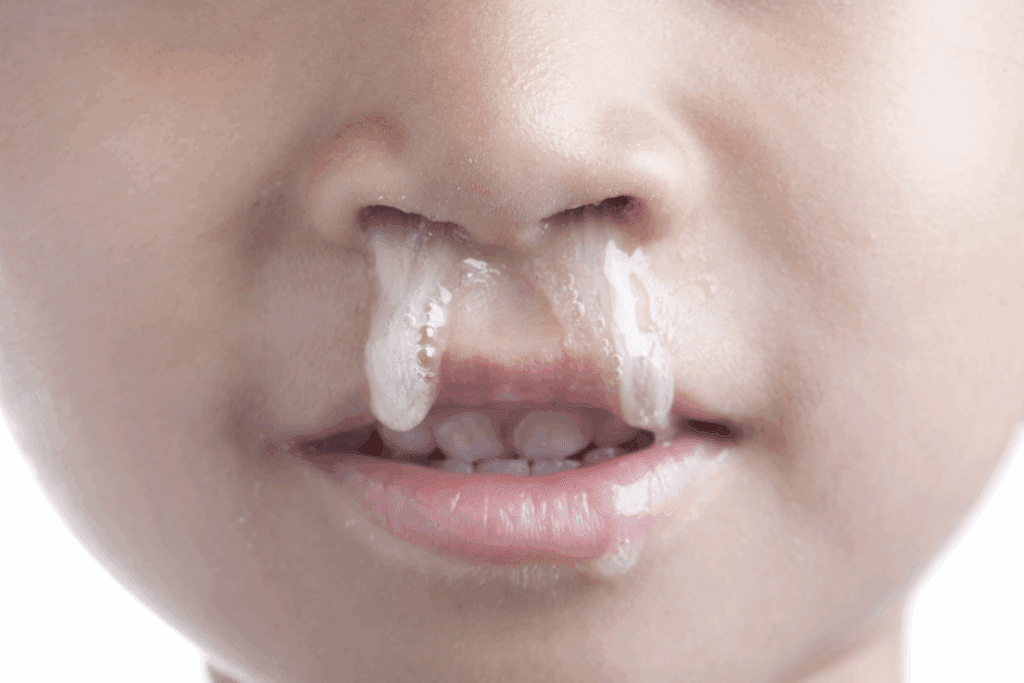
Thick nasal mucus can really get in the way of our daily lives. We make over a liter of mucus daily, whether we’re feeling well or not. Our nose and sinuses make this mucus to catch dust, bacteria, and other stuff. A guide to understanding why is my snot so thick, covering dehydration, dry air, and infection as common causes, and how to thin it.
When nasal mucus gets thick and sticky, it might mean something’s off. This could be because we’re not drinking enough water, it’s too dry outside, we have an infection, or allergies. Knowing why our nasal mucus is thick is key to feeling better and breathing easier.
Key Takeaways
- Thick nasal mucus can be caused by dehydration, environmental factors, infections, or allergies.
- Nasal mucus plays a critical role in catching dust, bacteria, and other foreign particles.
- Understanding the causes of thick nasal mucus is essential to finding effective solutions.
- Effective solutions can help clear sinuses and improve breathing.
- Proper hydration and environmental adjustments can help manage thick nasal mucus.
Understanding Nasal Mucus: What’s Normal and What’s Not

Nasal mucus is key to our respiratory system’s health. It’s made up of mostly water and traps dust, pollutants, and bacteria. This helps keep our lungs clean.
The Purpose of Nasal Mucus in Your Body
Nasal mucus is vital for our breathing. It does several important things:
- It filters the air, catching harmful particles.
- It keeps the nasal passages moist and healthy.
- It helps remove pathogens and debris.
Normal Mucus Characteristics
Normal mucus is clear and thin. It might look slightly cloudy or white. This is because of cells and debris in the air we breathe.
The mucus’s look and feel can change. This can happen due to many things like the weather, how hydrated we are, and infections or allergies.
| Mucus Characteristic | Normal | Abnormal |
| Color | Clear or slightly cloudy | Yellow, green, or brown |
| Consistency | Thin and watery | Thick and sticky |
| Amount | Variable, but generally minimal | Excessive or persistent |
When Mucus Changes Indicate a Problem
Changes in mucus color, consistency, or amount can mean trouble. For example, yellow or green mucus might mean a bacterial infection. Too much clear mucus could be from allergies.
Knowing what’s normal helps us stay healthy. We can catch problems early and take action.
Why Is My Snot So Thick? Common Causes Explained

It’s important to know why your nasal mucus gets thick. Thick snot can signal an underlying problem. We’ll look at common reasons like dehydration, environmental factors, infections, and allergies.
Dehydration and Thick Mucus Connection
Dehydration is a main reason for thick nasal mucus. Without enough water, tiny hairs called cilia can’t work right. Cilia help clear mucus, but dehydration makes it thick and sticky.
Drinking lots of water is key to keeping mucus thin. Aim for eight glasses a day to help your mucus stay clear.
Environmental Factors
A dry climate or air can make your sinuses dry, leading to thick mucus. Air conditioning and heating systems can also dry out the air, making it worse.
Using a humidifier can help keep your nasal passages moist. This can make your mucus less thick.
Infections and Immune Response
Infections make your body produce more mucus as a defense. When you have a cold or sinus infection, your body traps pathogens with more mucus. This can make your mucus thick and colored.
Knowing how infections affect mucus can help you find the right treatment for thick snot.
Allergic Reactions
Allergies can also cause thick nasal secretions. When you’re exposed to an allergen, your body releases histamine. This can make you produce more mucus, which can be thick and clear.
Managing allergies by avoiding allergens and using the right medications can help reduce thick nasal mucus from allergies.
The Science Behind Mucus Production and Drainage
Our bodies produce over one liter of mucus every day. This substance traps dust, bacteria, and other harmful particles, keeping them from reaching our lungs. It’s a vital part of keeping our respiratory system healthy.
Mucus is made by the lining of our nose and sinuses. It’s constantly being produced to keep our respiratory system in top shape.
How Mucus Is Produced
Mucus is made by special cells in our nose and sinuses. These cells produce mucin, the main part of mucus. When mucin mixes with water, it forms a protective gel that catches foreign particles.
Many things can affect how much mucus we make. This includes our environment, health, and genetics. Knowing what affects mucus can help us manage it better.
The Role of Cilia in Mucus Clearance
Cilia are tiny, hair-like structures in our respiratory tract. They help move mucus towards our throat, where it can be swallowed or coughed out. This is how they help clear mucus from our airways.
For cilia to work well, they need to be healthy. If they’re damaged, mucus can build up, causing breathing problems.
What Happens When Mucus Drainage Is Impaired
When mucus can’t drain properly, it can cause a lot of respiratory issues. This includes congestion, sinusitis, and infections. If mucus is too thick or there’s too much of it, cilia can’t clear it out effectively.
Things like not drinking enough water, exposure to irritants, and certain health conditions can make mucus drainage harder. Knowing what these factors are can help us prevent and manage mucus-related problems.
| Factors Affecting Mucus Drainage | Impact on Mucus | Potential Consequences |
| Dehydration | Mucus becomes thicker | Impaired clearance, congestion |
| Environmental Irritants | Increased mucus production | Respiratory issues, sinusitis |
| Health Conditions (e.g., infections, allergies) | Changes in mucus consistency or production | Infections, chronic respiratory conditions |
Dehydration: The Primary Culprit Behind Thick Nasal Mucus
Not having enough fluids can make nasal mucus thick and sticky. Dehydration changes how mucus is made and how it moves. This can cause discomfort and make it hard to breathe.
How Water Content Affects Mucus Consistency
The water in mucus affects how it works. When we drink enough water, mucus is thin and catches bad stuff. But without enough water, mucus gets thick and hard to move.
Drinking enough water keeps mucus thin. This helps it move out of the nose more easily.
Signs Your Thick Mucus Is Due to Dehydration
Thick nasal mucus might mean you’re not drinking enough water. Look out for these signs:
- Dark yellow or amber-colored urine
- Dry mouth and throat
- Fatigue and lethargy
- Headaches
- Dizziness or lightheadedness
Recommended Daily Fluid Intake
How much water you need depends on several factors. Generally, drink 8-10 glasses a day. But you might need more when you’re sick or it’s hot outside.
| Activity Level | Recommended Daily Water Intake |
| Sedentary | 8 glasses (64 oz) |
| Moderately Active | 10 glasses (80 oz) |
| Very Active | 12 glasses (96 oz) or more |
Best Hydration Sources for Thinning Mucus
While water is best, other drinks can help too. Good choices include:
- Herbal teas
- Clear broths
- Electrolyte-rich beverages (for intense physical activity or illness)
- Fruits and vegetables with high water content (like watermelon and cucumber)
Drinking more water, like when you’re sick, helps your sinuses. Staying hydrated is a simple way to manage thick mucus.
Environmental Factors That Thicken Your Nasal Secretions
Many things around us can change how thick our nasal mucus is. The air we breathe, where we live, and how we heat or cool our homes matter a lot. All these can affect how thick and healthy our nasal secretions are.
Dry Air and Heating Systems
Dry air, often from heating systems in winter, makes nasal mucus thicker. This is because dry air takes away the moisture from our noses. Using a humidifier can add moisture back and keep our noses moist.
Air Conditioning Effects
Air conditioning cools us down but can also dry out the air. This dry air makes nasal mucus thicker and more uncomfortable. It’s important to keep the air cool but not too dry.
Arid Climate Considerations
People in dry places often have thicker nasal mucus because of the low humidity. This dry air can make sinusitis and other breathing problems worse. Drinking more water and using nasal sprays can help.
Pollution and Irritants
Pollutants like dust, smoke, and strong smells can also make nasal mucus thicker. These irritants can make our noses produce more mucus. Using air purifiers and staying away from pollutants can help our noses stay healthy.
In summary, many things around us can change how thick our nasal mucus is. By understanding these factors and taking steps like using humidifiers and avoiding pollutants, we can keep our nasal mucus healthy. This helps our breathing stay good.
Infections That Cause Thick, Discolored Mucus
When infections hit, our bodies make thicker, discolored mucus. This is our immune system’s way to fight off bad guys. Knowing how infections change mucus can help us figure out what’s wrong and how to fix it.
Bacterial Infections and Green/Yellow Mucus
Bacterial infections make more mucus, often turning it yellow or green. This color change comes from pus, which has dead cells and bacteria. Green or yellow mucus means your body is fighting off a bacterial infection. For example, infections like sinusitis or pneumonia can make nasal discharge thick and discolored.
Viral Infections and Mucus Changes
Viral infections, like the common cold or flu, also make more mucus. At first, the mucus is clear, but it gets thicker and changes color as the infection grows. Not all viral infections turn mucus green or yellow; that’s more common with bacterial infections. But, viral infections can make you feel really uncomfortable because of all the mucus.
Sinusitis and Thick Nasal Discharge
Sinusitis, or inflammation of the sinuses, also causes thick, discolored mucus. When sinuses get infected, they fill with mucus, leading to pain and trouble breathing. Sinusitis can be from viruses or bacteria, and the mucus looks different each time. Knowing if it’s a virus or bacteria is key to treating it right.
Post-Nasal Drip and Thick Mucus
Post-nasal drip happens when too much mucus drips down the back of your throat. It can cause coughing, sore throats, and discomfort. Thick mucus from post-nasal drip can be really annoying, leading to coughing and throat irritation. To feel better, we need to treat the infection causing the thick mucus.
Allergies and Their Impact on Nasal Mucus Consistency
Allergens can make our nasal mucus thicker. When we meet allergens, our body makes more mucus to catch them. This can cause congestion and discomfort.
Seasonal Allergies and Thick Mucus
Seasonal allergies, or hay fever, often make nasal mucus thick. Pollen in the air during certain seasons can cause allergic reactions. This leads to more mucus, which is clear or white.
Food Allergies That Affect Nasal Secretions
Food allergies can also change nasal mucus. When we eat something we’re allergic to, our body releases chemicals. This can make mucus thicker, often clear or white, and can cause congestion and sinus pressure.
Distinguishing Allergy Mucus from Infection Mucus
It’s important to tell the difference between allergy mucus and infection mucus. Allergy mucus is usually clear or white. Infection mucus is yellow or green because of pus. Allergy mucus often comes with itchy eyes and sneezing. Infection mucus may have fever and facial pain.
| Characteristics | Allergy Mucus | Infection Mucus |
| Color | Clear or White | Yellow or Green |
| Accompanying Symptoms | Itchy eyes, sneezing | Fever, facial pain |
| Duration | Variable, often seasonal | Typically resolves with treatment |
Managing Allergy-Related Thick Mucus
To manage thick mucus from allergies, avoid allergens, use medications, and make lifestyle changes. Antihistamines and nasal steroids can reduce symptoms. Using a humidifier can also help by keeping nasal passages moist.
Here are some tips to manage allergy-related thick mucus:
- Monitor pollen counts and stay indoors during peak pollen times
- Use air purifiers to reduce indoor allergens
- Consider immunotherapy for severe allergies
- Stay hydrated to help thin out mucus
Effective Solutions for Thinning Thick Nasal Mucus
When nasal mucus gets thick and sticky, finding ways to thin it is key. This helps restore normal nasal function. Thick snot can be a big problem, but there are many effective solutions to help.
Hydration Strategies
Drinking enough water is a simple yet effective way to thin thick nasal mucus. Keeping your mucous membranes moist makes it easier for mucus to drain. Aim for 8-10 glasses of water a day.
Eating hydrating foods like watermelon and cucumbers also helps. These foods add to your fluid intake.
Recommended hydration sources include water, herbal teas, and clear broths. Avoid diuretics like caffeine and alcohol, as they can dry you out.
Humidification Methods
Dry air often causes thick nasal mucus. A humidifier can add moisture to the air, thinning mucus and promoting healthy drainage. Use a cool-mist humidifier, like in your bedroom, to keep the air comfortable while you sleep.
Regular maintenance of humidifiers is key to prevent bacterial growth. Clean the device often and replace filters as needed to keep it working well.
Nasal Irrigation Techniques
Nasal irrigation is a great way to thin and clear thick nasal mucus. Saline nasal sprays or rinses moisturize the nasal passages and help clear mucus. Use a neti pot or a squeeze bottle with a nasal spray tip, filled with saline solution, to gently irrigate your nasal passages.
Proper technique means tilting your head, breathing through your mouth, and gently pouring the saline solution into the top nostril. Let it flow out through the other nostril.
Steam Inhalation Benefits
Inhaling steam is another effective way to thin thick nasal mucus. Steam loosens and liquefies mucus, making it easier to expel. You can inhale steam by taking a hot shower, using a steam vaporizer, or leaning over a bowl of hot water with a towel over your head.
Adding eucalyptus oil to the water can enhance the benefits of steam inhalation. Eucalyptus oil has natural decongestant properties that can help open up airways.
Medications and Treatments for Thick Nasal Mucus
It’s important to know about the different treatments for thick nasal mucus. This condition can be hard to manage, but there are many ways to help. You can try over-the-counter medicines, prescription drugs, or natural remedies.
Over-the-Counter Options
Over-the-counter (OTC) medicines can help a lot with thick nasal mucus. Decongestants and antihistamines are two common choices.
Decongestants work by making the blood vessels in your nose smaller. This makes it easier to breathe. Antihistamines are good if your mucus is caused by allergies.
Prescription Medications
Sometimes, OTC medicines aren’t enough. That’s when you might need prescription drugs. Antibiotics are used for bacterial infections that cause thick mucus.
Prescription corticosteroids can also help. They reduce swelling in your nose.
When to Avoid Certain Medications
It’s important to use medicines wisely. Taking too much of a decongestant can cause more problems. It can make your nose congested even more.
Always follow the dosage instructions. Talk to a doctor before starting any new medicine. This is very important if you have other health issues or take other medicines.
Natural Remedies Worth Trying
There are also natural ways to help with thick nasal mucus. Steam inhalation, using a saline solution to rinse your nose, and drinking plenty of water are good options.
| Treatment Option | Description | Benefits |
| Decongestants | Reduce nasal congestion by narrowing blood vessels | Ease breathing, reduce congestion |
| Antihistamines | Counteract allergic reactions | Relieve allergy symptoms, reduce mucus |
| Antibiotics | Treat bacterial infections | Clear infection, reduce mucus production |
| Nasal Irrigation | Flush out nasal passages with saline solution | Remove excess mucus, reduce congestion |
| Steam Inhalation | Loosen mucus with warm, moist air | Ease congestion, soothe nasal passages |
Conclusion: When to See a Doctor and Long-Term Management
Thick nasal mucus can be a big problem. But, knowing why it happens and how to manage it can help a lot. If your symptoms don’t get better or get worse, you should see a doctor. They can check for serious issues that need treatment.
Conditions like allergies or sinusitis need ongoing care. It’s smart to work with a doctor to make a plan just for you. This plan might include drinking enough water, using a humidifier, and taking medicine for your specific problem.
Keeping your nose healthy long-term means finding and fixing what’s causing the problem. This could mean staying away from things that irritate your nose, using medicine for allergies, or treating infections. By being proactive, you can cut down on thick mucus and feel better overall.
Knowing when to see a doctor about thick mucus is very important. If your symptoms are bad or last a long time, go see a doctor. They can help you figure out the best way to treat and manage your nasal health.
FAQ
What causes thick, clear nasal mucus?
Dehydration, dry air, or allergies can make nasal mucus thick and clear. Drinking enough water and using humidifiers can help.
Why do I have thick, glue-like mucus in my nose?
Dehydration or irritants can cause glue-like mucus. Drinking lots of water and avoiding pollutants can help.
What is a nasal mucus plug, and how is it formed?
A nasal mucus plug is a thick blockage in the nose. It can be caused by infections, allergies, or dry air. Drinking water and using humidifiers can help.
How can I get rid of thick nasal mucus?
Try drinking more water, using humidifiers, and nasal irrigation. Steam inhalation and over-the-counter meds can also help.
What is the difference between allergy-related mucus and infection-related mucus?
Allergy mucus is clear and thin. Infection mucus is thick and may be colored. Knowing the cause helps in treating it.
Can sinusitis cause thick nasal discharge?
Yes, sinusitis can cause thick, discolored mucus. It’s due to sinus inflammation, often from infection.
How does dehydration affect nasal mucus?
Dehydration makes nasal mucus thick and sticky. Drinking enough water helps keep mucus thin and easy to clear.
What are the best hydration sources for thinning mucus?
Water, clear broths, and electrolyte drinks are best. Avoid caffeinated and sugary drinks to stay hydrated.
Can environmental factors like dry air and pollution affect nasal mucus?
Yes, dry air and pollution can make mucus thick. Using humidifiers and avoiding pollutants helps.
Are there any natural remedies for thick nasal mucus?
Yes, steam inhalation, nasal irrigation, and anti-inflammatory foods can help. They make mucus thinner and easier to clear.
When should I seek medical attention for thick nasal mucus?
See a doctor if mucus is thick and doesn’t get better with self-care. Also, if symptoms are severe or don’t improve.
References
- National Center for Biotechnology Information. (2025). Why Is My Snot So Thick Causes and. Retrieved from https://www.ncbi.nlm.nih.gov/pmc/articles/PMC2866558/



































